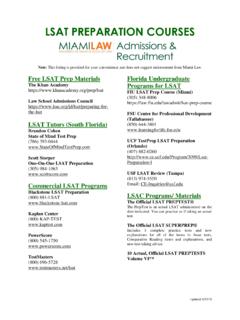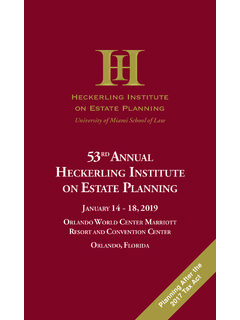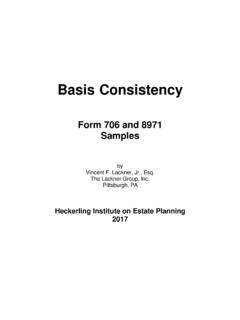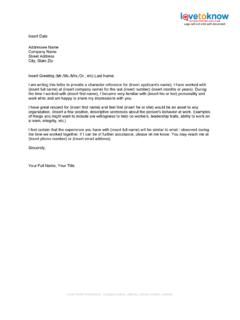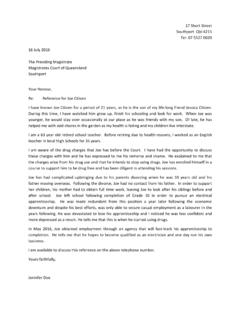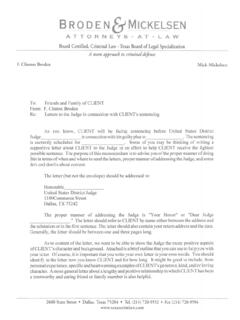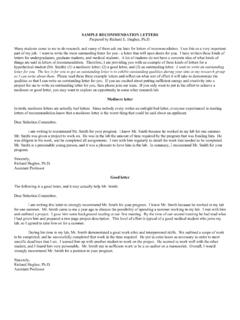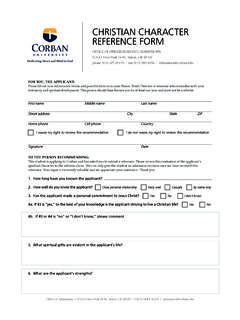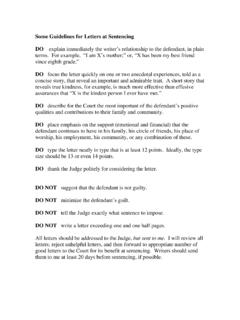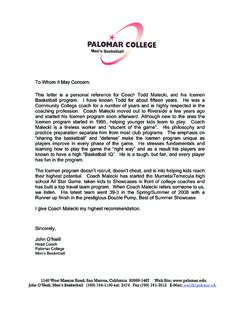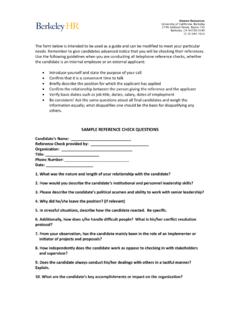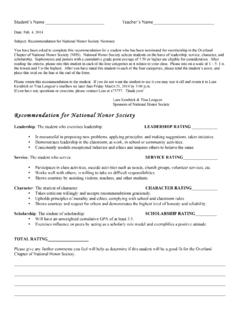Transcription of Letters of Recommendation Guide 2015 Final
1 A. INTRODUCTION A reference letter , or letter of Recommendation ,1 is usually written to attest to a person s skills, character and/or achievements. It is a formal document, and should be typed on letterhead, and written in a professional manner. During your law school career and thereafter, it is possible that you will need Letters of Recommendation to accompany a job application. When a potential employer requests a Recommendation letter , take the opportunity to enhance your reputation for professionalism by following some basic guidelines. B. TIMING IS IMPORTANT Do not procrastinate. Avoid the last minute scenario. When you ask for a letter of Recommendation , keep in mind that attorneys, employers, professors and references in general are quite busy and their time is limited. Therefore, asking someone for a reference letter the night before it is due, or the same day you need it, is not appropriate. Waiting until the last minute may make you look irresponsible.
2 A close deadline may also mean that a person will not have time to give the letter the required attention, or to even write it at all. So, a good rule of thumb is to make your request as far in advance as possible. If there is no stated deadline, let the person know when you plan to submit your completed application and ask if he or she can submit the letter at about the same time. If an application deadline is close and you are not sure whether a recommender has submitted a letter , or you are waiting for a letter to arrive so you can send your entire application packet together, then follow up with the writer. Most people will appreciate the reminder and will be happy to send you a confirmation e-mail when the letter is sent. C. ASK THE RIGHT PEOPLE If you want to ensure you receive the best possible Recommendation , be selective about whom you ask for a reference letter . Potential employers are interested in hearing about your legal analysis, practical experience, academic success and research and writing skills.
3 Non-legal employers will be able to speak to your general workplace skills and professionalism. Similarly, undergraduate professors know something about your work habits, personal characteristics and general intellect. Consider asking professors2 or former legal and non-legal employers to write Recommendation Letters for you. In fact, your references should consist of a hybrid of former employers and academicians so that the potential employer receives information regarding your overall qualifications. Most importantly, the person making the Recommendation needs to be familiar with your skills, capabilities, experience and performance, and be able to refer to specific examples whenever possible. Therefore, during law school, cultivate relationships with 1 The terms reference Letters and Letters of Recommendation will be used interchangeably throughout this Guide . 2 If you are asking a professor for a letter , be prepared to sign a FERPA (Family Educational Rights and Privacy Act) waiver form.
4 Under FERPA, professors are not permitted to disclose information about your grades or performance in the educational setting without your permission. So to write a meaningful letter that goes beyond generalities, your professor will need this permission. The FERPA form will also allow you to waive access to the letter , which may make the professor more comfortable writing it. professors so they can get to know you in order to be in a position to comment specifically on your qualifications for a job and be comfortable accepting your request. Former or current legal and non-legal employers with whom you have a positive relationship are also good candidates for Recommendation Letters . You should request a letter from a current employer only if you are on good terms with the employer, and you are sure that he or she will respond positively to news that you are leaving. If your current employer does not know you are applying for other jobs, it is fine not to ask for a letter .
5 Letters of Recommendation from employers may contain evidence or confirmation of some or all of the following: Previous positions held in the company Summary of job responsibilities Strengths, skills and talents Grades in a particular class Attendance and participation in class Initiative, dedication, integrity, reliability, etc. Ability to work with a team and/or independently D. MAKING THE REQUEST : HOW TO APPROACH PEOPLE First, make a list of professors and/or supervisors who will be your best advocates. Then, set up an appointment, preferably in person, to discuss your request, especially if it is the first time you have asked that particular person to write a letter of Recommendation for you. Requesting Letters of Recommendation via e-mail is permissible in certain circumstances such as if your recommender has recently written other Letters for you, or is a good distance away. In your e-mail, however, you should offer to meet with the recommender to discuss your application just in case he or she would prefer an in-person (or telephonic) meeting.
6 When requesting a letter of Recommendation , you should: 1. Articulate your reasons for the Recommendation , discuss the job you are applying for, why you are interested in it and how your specific qualifications and experiences make you a good candidate. While people are generally happy to provide Recommendation Letters , they may not remember all the specific details about you that will enable them to write a strong letter . This is yet another reason for an initial face-to-face meeting which gives you a chance to remind them. 2. Provide your resume so that the recommender can review your experiences and comment specifically on your qualifications. Be prepared to provide a writing sample as well, in case the recommender wants to review your writing skills. 3. Let recommenders know whether they should send their Letters directly to your prospective employer or to you to include as part of a complete application package. If the recommenders prefer to keep their Letters confidential, but you have been asked to submit your application as a complete package, ask them to send the Letters to you in sealed envelopes to ensure confidentiality.
7 4. While many recommenders prefer to use their own letterhead envelopes and stationery to prepare Letters of Recommendation , offer to provide stamped envelopes in which to send the Letters as a courtesy to the recommenders. 5. Finally, remember that Letters of Recommendation are written on a voluntary basis. A faculty member or employer may decline to write one for you. If you sense reluctance or the answer is no, ask someone else. You want Letters only from people who enthusiastically support your application. E. MAKE IT EASY FOR THEM Once the person commits to writing a letter , make it easy for him or her. For example, provide the name and address of where the letter needs to go, the deadline involved, the position you are applying for, any criteria sought for the position and all other relevant information. Feel free to suggest what you would like them to say within reason. For example it would be helpful if you could discuss how well I did in your class.
8 If you think you are asking for something unreasonable, then do not ask. Another thing you can do is offer to write a draft of the Recommendation letter for the recommender. Sometimes, people are more than willing to accommodate your request, but they find it difficult due to time constraints. Therefore, offering to write the letter for them can alleviate the situation and also makes it easier for the recommender. If he or she refuses the request, then leave it alone. F. THE CONTENTS3 The following is a basic outline of the structure of a reference letter : Use a business letter format with the recipient s name and address, if known, and address them as Dear [name]. If the recipient is unknown, then use Dear Sir/Madam. The first paragraph can contain a brief introduction of the recommender, explaining his or her position and relationship to you (the candidate). The second paragraph may confirm any facts which are known about the candidate such as your job title and role within the company, the dates of employment or the dates during which the recommender was your professor.
9 In the third paragraph, the recommender should aptly describe your skills and qualities. For instance, he or she may state that you were highly dedicated and committed to the job; that you possess an excellent work ethic, drive and enthusiasm; that you pay particular attention to detail or have a keen ability to lead; that you were highly valued and the recommender would gladly re-employ you; and that your contributions to your law school class were invaluable (if a professor). This is where the recommender can single out any exceptional qualities you possess which would be impressive to the potential employer. Where possible, the fourth paragraph can give a couple of concrete examples of times when you excelled in your job or in class. 3 Obviously, if the recommender opts to write the letter and does not accept your offer to draft it for him or her, you would not make these suggestions regarding content and let them write their own letter .
10 Close the letter on a positive note, and if the recommender is willing to receive further correspondence about your application, be sure they make this clear. Include the recommender s contact details too. As with any business letter , end the letter appropriately; Sincerely. G. AND Always send a thank you note expressing your appreciation to the people who wrote Recommendation Letters for you. While an e-mail is acceptable, many people, especially those who did not grow up with e-mail, really appreciate a handwritten thank you note. It is also appropriate to let them know the status of your job search in the note. If you accepted the position, you should follow up with this information. Your recommenders will appreciate knowing that their efforts were instrumental in your career advancement. SAMPLE Letters OF Recommendation SAMPLE letter OF Recommendation #1 (FOR LAW STUDENT) NAME ADDRESS PHONE NUMBER EMAIL DATE Ms.
